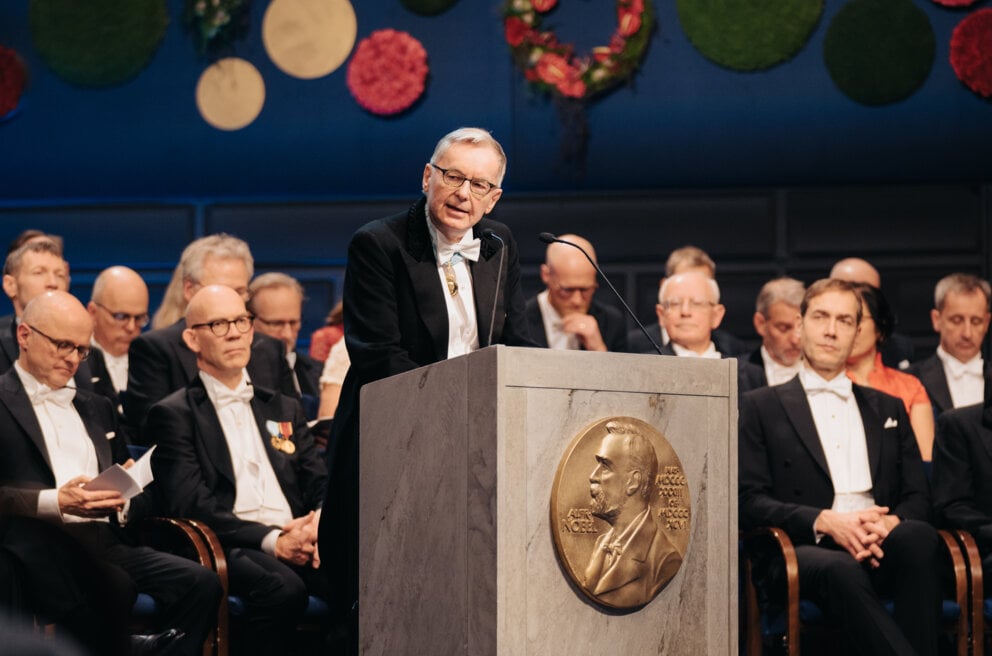Award ceremony speech

Professor Anders Olsson delivering the presentation speech for the 2022 Nobel Prize in Literature at Konserthuset Stockholm on 10 December 2022.
© Nobel Prize Outreach. Photo: Clément Morin
English
Swedish
Presentation Speech by Professor Anders Olsson, Member of the Swedish Academy, Member of the Nobel Committee for Literature, Chairman of the Nobel Committee for Literature, 10 December 2022.
Your Majesties, Your Royal Highnesses, Esteemed Nobel Prize Laureates, Esteemed Nobel Prize Laureates in Literature for 2020 and 2021, Ladies and Gentlemen!
There is a question that increasingly occupies contemporary literature: What does writing about one’s own life signify? Where is the delineation between “fiction” and “reality”? Few have tackled the issue with the commitment of Annie Ernaux. Charged by the words of poet Arthur Rimbaud – “Je suis de race inférieure de toute éternité” (“I have always belonged to an inferior race”) – she determined early on to rehabilitate the social class she rose from. Driving her is a force and a demand for justice, but instead of emulating the poet’s language of imagination to transfigure reality, she chose a different path. For Ernaux, language is a means to dispel the fog of memory and a knife to uncover the real.
Her debut from 1974, Cleaned Out, was the commencement of Annie Ernaux’s study of her maturation in the little Normandy community of Yvetot, a work of reconstruction that has endured in her writing. The first three books were still narrative accounts labelled ‘novels’ and in the impassioned debut, the 20-year-old main character, fleeing from her social constraints, is a fictitious character called Denise Lesur. But Ernaux soon abandoned her fictional devices. She has said that her debut work could equally have been called “Getting rid of Annie Duchesne”, her maiden name. This is revelatory regarding her ambitions. Ernaux always writes autobiographically in a wider sense, setting the ego in a larger social and historical context. In her most elaborated work, The Years, it results in what has been called “collective autobiography”, written not in the first person but in the third, and where her own life story fuses with the development of French society over six decades.
Annie Ernaux’s breakthrough came with A Man’s Place (1983), in its brevity a masterful portrait of her father and the working class background that marked him. The book could be written only from the other side of the class barrier she was forced to transgress to become the writer she is. She writes in solidarity with her father to overcome her self-perceived treachery against his world. The language is as received, with her father’s simple phrases seemingly engraved in the strictly factual text. Ernaux’s vision is double, aware to what she has witnessed as a daughter, but also revealing the distance she has, with time, accrued. In A Woman’s Story she writes about her mother in prose as harsh as it is perceptive, as later in L’autre fille about the sister who died young of diphtheria before Annie knew her and never spoken of by their parents. This extraordinary book, written in the form of a letter to her sister, bears a strong inner drama, wherein Ernaux tries to reconcile the absence of her sister.
Annie Ernaux’s writing is restrained with feelings and expressions of emotion, but passion pulses beneath the surface. Relentlessly, Ernaux exposes the shame that penetrates class experience. This occurs in Shame, where her father’s situation is exposed in scenes that are as suffused with violence as they are humiliating. And from another direction in her depiction of her illegal abortion at the age of 23, in Happening, so devastating in its succinctness and controlled rage. She has written: “I have always desired to write books that would be impossible to talk about, that make the gaze of the other unbearable.”
An unrelenting gaze and a plain style are Annie Ernaux’s characteristics, and that she succeeds in making her pain relevant to all.
Dear Annie Ernaux,
allow me to convey the warm congratulations of the Swedish Academy, while asking you to step forward to receive from the hand of his Majesty the King the Nobel Prize in Literature.
Translated by Kim Loughran
Copyright © The Nobel Foundation 2022
Nobel Prizes and laureates
Six prizes were awarded for achievements that have conferred the greatest benefit to humankind. The 12 laureates' work and discoveries range from proteins' structures and machine learning to fighting for a world free of nuclear weapons.
See them all presented here.
